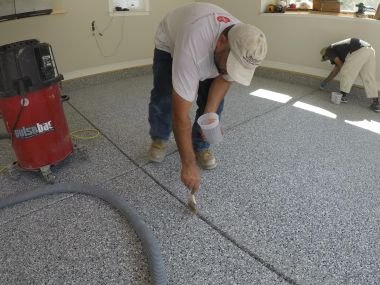How Power Washing Helps You Combat Peak Pollen Season

As Raleigh and Wilmington, North Carolina enters peak pollen season, remember that Anderson Painting is here to help keep pollen problems at bay with professional power washing.
Pollen Season in Raleigh, North Carolina
Raleigh and Wilmington, North Carolina takes pride in its beautiful hardwood trees, like red maple and oak. The place is also abundant in ragweed, Bermuda grass, and tall fescue. As beautiful as these plants may be, they also release large quantities of pollen at certain times of the year.
Tree pollen season starts in March and can last until June. On the other hand, weed pollen typically runs highest in August. For grasses, the peak runs from April to September. Generally, the pollen season tends to peak in April.
We are now entering April, which means you are soon to see unsightly yellow dust dangling from trees, flying everywhere, and covering everything again. It is also time to think of power washing—an effective way to combat the effects of pollen season.
Problems Posed by Pollen Season
While pollen is essential—it’s the reason we still have fruits and vegetables on our tables—it causes a variety of problems. Here are some of the issues you can face when clouds of pollen start gathering in your area:
Allergies
Allergies are the most common pollen-related problem. Pollen allergies, also called seasonal allergic rhinitis, can cause sneezing, swelling around the eyes, red and watery eyes, and a runny, itchy, stuffy nose.
During peak pollen season, pollen counts are high. Pollen counts refer to the amount of pollen in the air. For allergic individuals, it signifies limited time and activities outdoors. If you love spring, pollen could make it hard for you to enjoy the season.
Even if you stay indoors, there is no guarantee you are safe from pollen. It can enter your home through the joints or gaps in your window and doors. It can also sneak in when you open your doors and windows to let fresh air in. It may get past your heating, ventilation, and air conditioning (HVAC) system's air filter, making its way inside your home.
Diminishing Curb Appeal
In addition to allergies, clouds of pollen can also diminish your property's outside appearance. Pollen has tiny tentacles that allow it to stick to surfaces easily. From vinyl siding, wooden decks, fencing, and concrete to your kitchen floors and cabinets, it sticks to almost everything in your residential or commercial building.
A small pollen count will not have a significant impact on the appearance of your property. But when the peak season starts and the pollen count begins to rise, your place can be caked with unsightly yellow powder. The layer of pollen alone can be an eyesore.
If you let the fine yellow dust sit on certain parts of your property for a while, like a roof, it can cause staining. Depending on the surface, the staining can become permanent. Moreover, pollen can act like double-sided tape, trapping dust, mold spores, dirt, and other debris blown through the air, making surfaces dirtier.
Property Damage
Aside from making your property look less appealing, pollen can also do some damage. It can get underneath your roof tiles and shingles, causing moisture and leak issues. Even metal roofs are not pollen-proof. The build-up of this fine yellow and green dust can contribute to the deterioration of the metal roof's acrylic layer.
Pest Infestation
Birds, bees, beetles, and other pollinators bring pollen around the ecosystem. So, when there is pollen, pests are likely to come around. If they stay on your property longer, they may create problems for your building and landscape. They may start nesting near your home or office.
Power Washing and How It Can Help You During Pollen Season
As mentioned above, pollen sticks to almost everything and can ruin the way your house or commercial building looks. It is also notorious for triggering allergies.
You may have already tried using water and a garden hose to remove pollen. This method works, but only on some surfaces, usually vertical ones. When the pollen sticks to siding, which is horizontal, or makes its way into crevices and cracks, you will need more than just a garden hose. This is where professional power washing comes in.
Benefits of Power Washing
If you're a bit hesitant about hiring someone to power wash your place, it's probably best to first ask, "What are the benefits of power washing?" Here's the answer:
Power washing makes it harder for pollen to stick to siding. Pollen is sticky, attracting dirt and debris. It is pretty common for siding to become covered in dirt. It happens because wind and cars driving by your house can cause debris to fly into the air and leave your siding a mess. By making sure the siding is clean, pollen won’t stick to it easily.
Power washing removes any pollen, dirt, and other debris that is already accumulated. Power washing offers an effective way to remove all pollen, alongside any dirt in different areas of your house or cracks and crevices. If you have allergies, you may ask, “Does pressure washing help with allergies?” Well, with all pollen gone, you can also say goodbye to seasonal allergies.
Power washing improves exterior appearance and keeps paint looking fresh. Layers of pollen outside your property can be an eyesore. For commercial properties, the pollen may even send the wrong message to clients and passersby. Power washing quickly solves this issue and restores the property to its former glory.
You may be considering getting a pressure washer and removing pollen from your property yourself. But the DIY process is more complex than it looks. Pollen is so light that it does not really rinse away. It just mixes with the water, creating a sticky mess. You also need to get the pressure right to avoid damaging the paint or masonry. Apart from that, it’s important to determine what cleansers are tailored to your situation. So generally, it can be difficult to get the result you want without the proper tools, knowledge, and experience.
You may also miss some spots. When that happens, you may find unsightly stains around your house. In the long run, you end up with a house that needs a repaint. For guaranteed results, you’ll find it best to leave power washing to professionals. Experts know exactly what to do to remove pollen and other debris from your property.
When to Power Wash
Now that you know the benefits of power washing, you’re probably wondering when to get one. So, what season is best for pressure washing?
Generally speaking, it’s wise to invest in power washing two times a year, about six months apart—once in the spring and again in the fall. Sticking to this frequency allows you to keep seasonal dirt, debris, and damage in check. As such, the peak of pollen season, which happens in spring, is an ideal time to tackle this project.
Power Washing From Anderson Painting
If you’re dealing with pollen problems and spending time searching for “power washing near me,” Anderson Painting can help. Our team efficiently cleans pollen from every nook and cranny of your property without damaging the paint or siding.
If pollen from the previous seasons has already caused damage to your paint or walls, you can also count on our team for painting and repair work. Anderson Painting can be your one-stop shop for painting, power washing, exterior repairs, and more.
For more on power washing, feel free to call Anderson Painting today.




